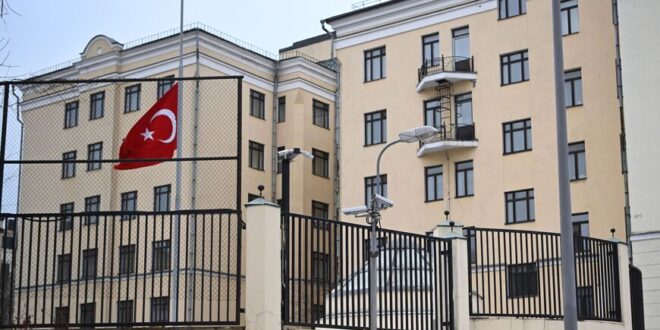The appointment of Ankara’s new envoy to Moscow coincided with the Kremlin’s announcement that the Russian president will soon visit Turkey.
Newly appointed Turkish Foreign Minister Hakan Fidan named the ministry’s spokesperson Tanju Bilgic as his country’s new ambassador to Moscow on Friday, Turkey’s state-run Anadolu News Agency reported.
Bilgic’s appointment, which will become official after its publication on the Official Gazette, coincided with the Kremlin’s announcement that Russian President Vladimir Putin would soon visit Turkey. Putin’s aide Yuri Ushakov said Friday that Turkish President Recep Tayyip Erdogan and Putin agreed on the visit and that planning was underway without giving a timeline, Russia’s Interfax reported.
Bilgic, who previously served as Turkey’s ambassador to Belgrade, will replace Mehmet Samsar, who has held the post since 2019 and overseen a tense chapter between the Turkish-Russian ties that saw the Russian invasion of Ukraine, the start of high-level political talks between Ankara and Damascus and the 2020 war between Armenia and Azerbaijan over the contested region of Nagorno-Karabakh.
Bilgic’s tenure will likely see swift developments on these files. Russian Foreign Ministry spokesperson Maria Zakharova listed them as priority agenda items in the two countries’ ties.
Speaking to Russian state media outlets Thursday, Zakharova said that Fidan and Russia’s Foreign Minister Sergey Lavrov had laid out a series of priority agenda topics during their first phone call on June 9. Zakharova listed those topics as combating terrorism in the Middle East, disagreements over the extension of the Black Sea Grain Initiative and Ankara’s normalization talks between Damascus and Yerevan.
The Turkish, Syrian, Russian and Iranian deputy foreign ministers are set to gather in Astana, the capital of Kazakhstan, to continue the Kremlin-brokered high-level talks that began between Ankara and Damascus late last year. The talks aim to end more than a decade of hostility between Ankara and Damascus. Turkey backs Sunni Syrian rebels fighting to oust Syrian President Bashar al-Assad’s government, while Iran and Russia remain the main international supporters of Damascus.
Fidan was the Turkey’s intelligence chief before becoming foreign minister and held multiple meetings with his Syrian counterparts, laying the groundwork for the current negotiations between Turkey, Syria, Russia and Iran. Ankara seeks the return of some of the more than 4 million Syrians living in Turkey.
Damascus, in turn, is pressing for the withdrawal of Turkish troops from Syrian territories that had come under the control of Ankara and its Sunni allies through a series of Turkish military operations in Syria. Turkey, however, asserts that a withdrawal could only be achieved with a road map that would quell Kurdish-led self-rule in northern Syria. Turkey sees Syrian Kurdish groups as terror organizations and is seeking to set up a safe zone 30 kilometers (18 miles) deep free of Kurdish groups along the Turkish border. Turkey’s National Security Council announced last week that Syria’s territorial integrity could only be maintained by clearing terror groups from Syria.
Another item high on the both countries’ agenda is the extension of the Black Sea grain deal. The deal brokered by Turkey and the United Nations that allows Ukrainian grain and other products to reach world markets will expire in late July after it was extended for two months before Turkey’s May 14 general elections.
 Eurasia Press & News
Eurasia Press & News



